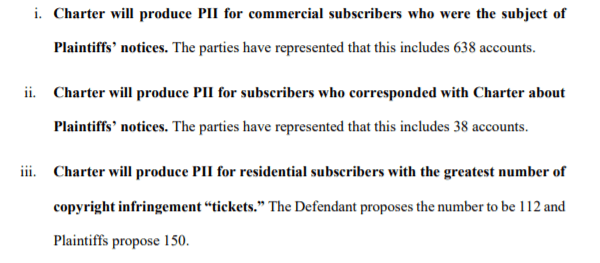Every day, ISPs send thousands of copyright infringement notices to subscribers, informing them that their connections have been used to download pirated content.
These warnings have long been without consequences. However, copyright holders in the US are working hard to change that.
The major record labels filed several lawsuits against ISPs for failing to terminate repeat infringers. These are serious claims, as became apparent from a billion-dollar damages judgment against Cox not too long ago.
Charter Communications is currently caught up in a similar lawsuit. The company, which has millions of subscribers, endured a setback last month when its motion to dismiss the vicarious copyright infringement claims was dismissed.
This week there is more bad news. As part of the discovery process, the music companies asked Charter to hand over the personal information of roughly 11,000 subscribers who received infringement notices. The ISP refused to do so, but the music companies insisted.
To break this stalemate, the court asked special master Regina Rodriguez to decide over the issue. This week she released her order, which is somewhat of a compromise.
Charter argued that handing over the personal details would cause piracy issues. In addition, it would be a burdensome process as the California Consumer Privacy Act requires the ISP to notify all these customers to allow them to respond.
In her order (pdf), Rodriguez agrees that this would indeed be burdensome, also for the court.
“While the information may be relevant, the notification of 11,000+ customers, and the potential legal challenges flowing therefrom, would be burdensome to the parties as well as to the courts,” she writes.
As a solution, she suggested limiting the hand over of personal information to a small subset of alleged pirates. Both parties were asked to agree on how large this sample would be, which resulted in the following compromise.
Charter is required to share the personal details of all commercial subscribers who received notices, 638 in total. In addition, the ISP must also share information on the 112 subscribers who received the most notices, as well as the 38 subscribers who reached out to Charter about the notices.
The music companies also requested DHCP logs from Charter to link copyright infringement notices to particular subscribers. The ISP countered that the logs would not be sufficient to do this, but admitted that querying its internal systems would make it possible. This request was also granted by the court.
“Defendant is ordered to produce information sufficient for Plaintiffs to match the IP addresses contained in infringement notices served on Charter with particular subscribers,” Rodriguez ordered.
The full order lists several other requirements and also includes some good news for the ISP. For example, it asked for a full harddrive with evidence from the anti-piracy company MarkMonitor, which the music companies used to track the infringing activity.
MarkMonitor shared this information, but only with the music companies. These are now required to share everything, including all metadata, with the ISP.
“The Plaintiffs inserted themselves into the dispute when they accepted the production from MarkMonitor, and they cannot now attempt to sidestep their assumed obligation to produce accurate information,” the order reads.
How the record labels plan to use the subscriber information to assist their case against Charter is not entirely clear. It is possible, however, that they will reach out to some alleged infringers to gather further evidence against the ISP.


 Every day, ISPs send thousands of copyright infringement notices to subscribers, informing them that their connections have been used to download pirated content.
Every day, ISPs send thousands of copyright infringement notices to subscribers, informing them that their connections have been used to download pirated content. 




